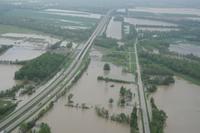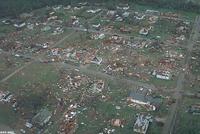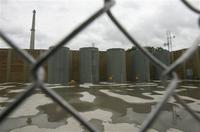-
DHS allocates $25.5M for border communications
DHS recently announced that it would spend $25.5 million on additional security measures along the border; the money will be allocated to states as part of the Border Interoperability Demonstration Project (BIDP) which is designed as a one-time competitive grant program to develop innovative solutions that improve emergency communications for first responders and law enforcement agents; seven states including California, Maine, and Texas will receive grants
-
-
Missouri levee blast floods 130,000 acres, but saves Illinois city

On Tuesday, the U.S. Army Corps of Engineers blasted a section of a levee along the Mississippi River to create a controlled breach that would relieve pressure and prevent the town of Cairo, Illinois from becoming engulfed in record flood levels; the blast created a gap more than 10,000 feet wide at Birds Point, Missouri levees and inundated more than 130,000 acres of farmland; heavy rains have left the Mississippi and Ohio Rivers swollen, putting Cairo and its 3,000 residents at great risk as it sits on a narrow stretch of land between the two surging rivers; on Monday, the Corps received permission from the federal government to go ahead with its plan, despite Missouri’s protests
-
-
Government moves quickly to help storm victims in South

So far residents have been fairly pleased with the government’s response to the worst natural disaster to hit the United States since Hurricane Katrina; after tornadoes touched down in seven states on Wednesday, Secretary Napolitano and other top federal officials immediately began contacting governors in the affected states; just hours after the storms had ravaged Alabama, Obama signed the declaration of disaster in Alabama and by Thursday he had done the same for Georgia and Mississippi; by Friday afternoon FEMA liaison officers had been deployed to Alabama, Georgia, Kentucky, Mississippi, and Tennessee; the storms have killed at least 350 people, injured more than 2,200, and left tens of thousands homeless in seven states
-
-
California school building regulators had ties with anti-regulation lobby group
A California watchdog group recently revealed that state officials in charge of enforcing earthquake standards for school buildings have had a long and questionable relationship with a lobbying group that actively works to oppose building safety regulations in public schools; senior officials with the Division of the State Architect had been dues paying members of the Coalition for Adequate School Housing, which actively lobbies for less regulation on school construction; in 1997, state regulators were told that taxpayers would reimburse their membership dues to be a part of the lobbying group; officials maintain that there has been no corruption; in 2010 a major regulatory provision in place since 1933 was removed
-
-
DHS IG criticizes FEMA's IT systems
DHS Inspector General says that FEMA’s IT systems “do not support disaster response activities effectively”; the IG recommends that FEMA develop a comprehensive IT strategic plan with clearly defines goals and objectives to support program IT initiatives, and that FEMA establish an agency-wide IT budget planning process to include all FEMA program technology initiatives and requirements
-
-
Busy hurricane season ahead for U.S.
Forecasting organizations predicts that the coming hurricane season in the United States will see 15 named storms, 8 hurricanes, and 4 intense hurricanes (category 3 or greater); these 2011 forecast numbers are above the long-term (1950-2010) averages of 12 named storms, 7 hurricanes, and 3 intense hurricanes
-
-
Missouri pounded by rains and tornadoes, thousands evacuate
This week heavy rain storms are raging across the mid-west and south forcing thousands of residents in Missouri to flee as swollen rivers threaten to flood their homes; in some areas emergency responders do not have many options and can do nothing but hope that the levees hold; the mid-west will not see any respite from the storms until Thursday as another major storm system is about to hit; officials are bracing for substantial flooding; the region is still struggling to recover from major storms that spawned tornadoes in six states killing forty-five people and damaging structures; Missouri has requested aid from the Federal Emergency Management Agency
-
-
Japanese app helps spread earthquake warning
After the 9.0 magnitude earthquake and tsunami ravaged Japan, hundreds of thousands of people have signed up for a new emergency warning app for their iPhones; when an earthquake is predicted to hit, the iPhone app, called Yure Kuru, will send out an alert and let subscribers know when the quake is coming, where the epicenter is located, and how bad the shaking will be; the app was developed by Tokyo based RC Solution Co., which specializes in mass alert systems and spreading information in the event of an emergency; since the 11 March earthquake, the company’s subscribers have sky rocketed from 100,000 to more than 1.5 million
-
-
Japan quake reconstruction could take ten years
Yesterday an advisory panel to the Japanese government announced that it could take a decade to rebuild Japan after the 11 March earthquake and tsunami wiped out much of north-eastern Japan; the council said that the first three years alone would be devoted to building roads and erecting temporary housing for the thousands of families that have been displaced; rebuilding towns could take another four years and a full recovery might take even longer; the damage from the recent quake was far greater than the large quake that struck Japan in 1995; Prime Minister Kan’s cabinet has approved almost $50 billion in spending for post-earthquake rebuilding
-
-
Iran's control systems attacked by another virus

Iran admitted it has been attacked by another virus aiming to disrupt its industrial control systems; the commander of Iran civil defense said, though, that the virus has been caught in time and neutralized by Iran’s “young experts”; Gholamreza Jalali described the virus as “congruous and harmonious with the (computer) system and in the initial phase it does minor damage and might be mistaken for some executive files of government organizations”; in the summer, nearly 42,000 computers and servers in Iran’s industrial control systems — many of them in Iran’s nuclear weapons program — were infected; the damage to uranium enrichment centrifuges was especially great, causing Iran in mid-November to halt enrichment operations; Stuxnet has also infected the Bushehr nuclear reactor; the reactor was supposed to come on line in August, but it is still not operational, and has missed several start-up deadlines
-
-
AT&T shows mobile cell towers for disaster communication

A new family of solutions from AT&T will make business, government, and public safety agencies better prepared for natural or man-made disasters; one of the new offerings, the “Fly-away” solution, packs a small cell site into a suitcase, offering first responders an easy-to-use, transportable system that can bring voice and data coverage to an area where disaster has knocked out communication channels
-
-
Wyoming braces for spring floods
The Wyoming Office of Homeland Security is readying local and state agencies for projected spring floods and is urging local residents to prepare themselves as well; this year large snow packs from heavy winter storms have increased the likelihood of flooding; state officials are encouraging families to keep a three-day emergency kit loaded with food, water, clothing, flashlights, medicine, and important documents; last year floods hit Wyoming causing major disruptions, particularly in Fremont County; this year state officials hope to minimize the impact of floods with early preparation
-
-
Cooling pools or dry casks for nuclear waste: which is safer

There are two ways to store nuclear waste: in pools of water, where the densely packed uranium rods are cooled by a constant flow of circulating water, or in dry casks — typically barrel-shaped steel-and-concrete structures that stand twenty feet high and sit outdoors — where the uranium loosely packed rods are cooled by passive air; there are 65,000 tons of nuclear waste in the United States, more than in any other nation, and this amount grows by about 2,200 tons each year; the Fukushima disaster demonstrated that dry casks were able to withstand the 11 March combination of earthquake and tsunami much better than cooling pools; the U.S. Nuclear Regulatory Commission must now decide whether cooling pools are safe enough to store nuclear waste, and even whether densely packing nuclear waste is safe
-
-
Understanding crowd behavior in disasters
Researchers have developed a new model for the behavior of pedestrians and crowds; most simulation software is often based on physics-inspired assumptions, such as repulsive forces between pedestrians; the new, psychologically based model, in contrast, assumes that pedestrians try to minimize the coverage of their vision field, while adjusting the walking speed to keep a safety distance from other people; the new approach can help in understanding and preventing tragic crowd disasters, developing better architectural designs and new navigation approaches in robotics
-
-
Lessons from Japan's tsunami could dramatically shift building codes
American tsunami experts and engineers are scouring the devastation wrought by the 11 March earthquake and tsunami to analyze how structures fared during the natural disasters and what lessons can be applied to U.S. building codes; experts are particularly concerned about the toppling of a reinforced-concrete building as that has been the baseline for tsunami construction and evacuation procedures; experts were stunned by the devastation and are concerned about America’s West Coast which is significantly less prepared than Japan for an earthquake or tsunami; in particular experts are concerned about Oregon which shares many geological similarities to Japan’s northeastern coast; researchers hope to learn valuable lessons that will minimize the destruction from a similar event in the United States
-
More headlines
The long view
The Surprising Reasons Floods and Other Disasters Are Deadlier at Night
It’s not just that it’s dark and people are asleep. Urban sprawl, confirmation bias, and other factors can play a role.
Why Flash Flood Warnings Will Continue to Go Unheeded
Experts say local education and community support are key to conveying risk.
